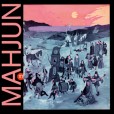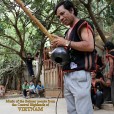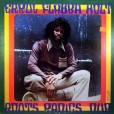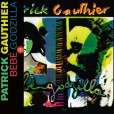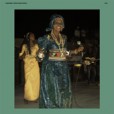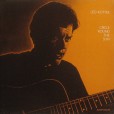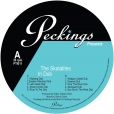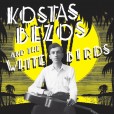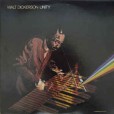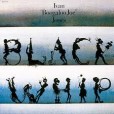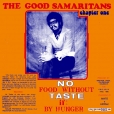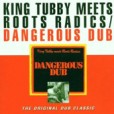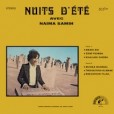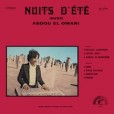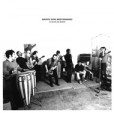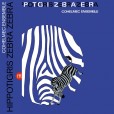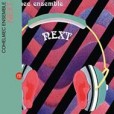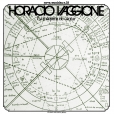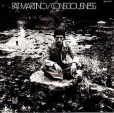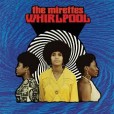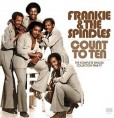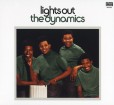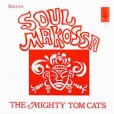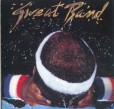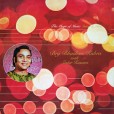Your basket is empty

Their classic, influential, second Saravah, from 1974, joined by the great Brazilian percussionist Nana Vasconcelos. Leftist folk prog turned outernational psychedelic fusion. Try fourteen-minutes-long La Ville Pue.
Keyboardist with Heldon, Magma and co, joined on his debut LP by the likes of Richard Pinhas and Christian Vander — no less — together with Bernard Paganotti, François Auger, Didier Batard… An outstanding mixture of synthy electronics and jazz-rock. First vinyl issue.
Lovely, hypnotic, rocking peulh music from Dilly commune, Mali, near the border with Mauritania (and the same family grouping as the celebrated singer Inna Baba Coulibaly). Duelling ngonis, calabash, flute, dashes of electric guitar; newly recorded.
The unlikely Hawaiian-influenced Xabagies music of 1930s Greece: surrealist guitar portraits blurring Athens and Honolulu, haunting tropical serenades, wild acoustic orchestras, and heartbreaking steel guitar duets. With a 28-page booklet.
A moody, ambitious, intriguing record, originally released by Audio Fidelity in 1964.
Just two side-long tracks — and an amazing lineup, with Walter Davis on piano, bassist George Tucker, and two drummers together, Edgar Bateman and the great Andrew Cyrille.
The sleeve-notes quote a Downbeat article from the same year, claiming that Dickerson was the most important vibraphonist since Milt Jackson: ‘instead of solos made up of one related note following another, Dickerson often builds areas of sound, placing them one on the other, creating a total effect.’
The title track is a pinnacle of funky soul jazz. No-nonsense chitlin manners, hard and tight, with none of the airs and graces of fusion. Sonny Phillips on electric piano, Ron Carter on bass. Jones nails it evilously. Ace drumming by Bud Kelly.
King Tubby meets the Roots Radics.
The second volume in Abdou’s unmissable Nuits trio of LPs, this time featuring his Casablanca home-girl, sahrawi diva Naima Samih.
Giddy psych, funk, jazz and electronica freak-outs from Casablanca. A combination of original compositions and folk tunes, crazily blending together Abdou’s wigging organ, rough beat boxes, wayward kit-drumming and crisp north African percussion, a little Hank Marvin and some sporting sing-a-long, and plenty of unfit-to-drive reverb and tape delay. A facsimile reissue of this collectors’ item, first out in 1976. Ace.
COH as in Jean Cohen (saxophones), EL as in Dominique Elbaz (piano) and MEC as in the brothers François and Jean-Louis Méchali (bass and drums) — joined by the American clarinettist and flautist Evan Chandlee for this debut album, originally released by Saravah in 1969.
“We wanted to avoid that kind of ‘free’ which is characterized by pounding drumming and a saxophonist freaking out in the high register, that type of music that kicks off suddenly then stops without us being able to sense the motivation. There is never any difference in intensity: nothing is destroyed, nothing is created, nothing is elaborated, nothing is questioned — when, even on the simple level of sound, there is so much that can be done.”
With French roots running back through the music of Jef Gilson, and pitched at the time somewhere between ESP and Actuel/BYG, with full-blooded nods to the likes of Cecil Taylor, John Coltrane and Walt Dickerson, this is expert, exuberant music-making, searching out its own way.
Ten tracks, even-handedly improvised and composed, beautifully played; intense and free-spirited but always engaging, attentive and communicative.
Top-notch sound; heavyweight gatefold sleeve with obi-strip; twelve-page booklet.
Their second LP, from 1971, with guitarist Joseph Dejean from the Full Moon Ensemble propelling the music forwards, as pianist Dominique Elbaz stands down.
The sound swells and contracts dramatically across the eleven tracks and interludes, with fresh senses of break-down and silence, and new intimacy. There is some Steve Lacy to its fierce repetition of key phrases; some Sharrock to Dejean; sparing experimentation with effects; portions of central African polyphony (Boa Constrictor), summer-breeze funk (Desert Angel), and plenty of characteristically rootsy prog and cosmic skronk.
Sweet soul from Baltimore, produced by none other than George Kerr and Bunny Sigler.
The opener Count To Ten was their big hit, grabbing a couple of bars of Smokey Robinson; Candy is treasurably cannibalistic (‘her heart’s made of caramel’ etc); that’s a secret-weapon version of War (What Is It Good For?).
